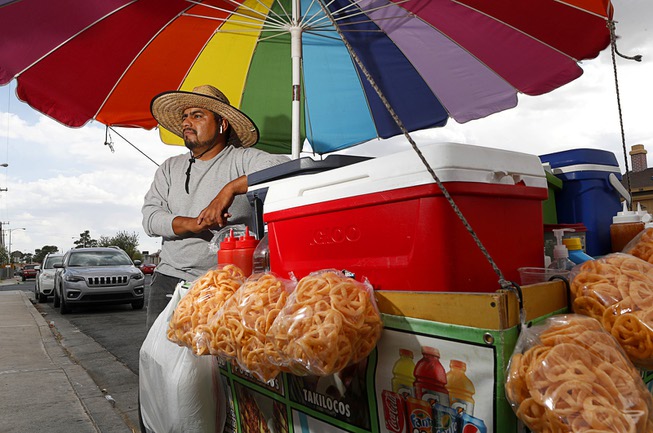
Street vendor Luis Sanchez waits for customers by his mobile food stand in a residential neighborhood in North Las Vegas Wednesday, June 14, 2023. Senate Bill 92, signed by Governor Joe Lombardo, when fully implemented, will legitimize street vendors across the state, providing them with the necessary permits to operate and grow their small businesses. A town hall session held by Make the Road Nevada and the Nevada Immigrant Coalition laid out what the expectations should be for vendors and law enforcement until the relevant laws take effect by July 1, 2024.
Tuesday, April 2, 2024 | 5:22 p.m.
A proposal to regulate street vending in Clark County was met with backlash today at a commissioners’ meeting by allies of the industry who say the added regulations would “threaten the very existence of our vendors’ businesses.”
The proposal would complement an initial ordinance passed last October that prevented sellers from setting up shop within 1,500 feet of a resort or event facility with a seating capacity of at least 20,000 such as Allegiant Stadium and T-Mobile Arena.
The new proposal would also restrict vendors from selling within 500 feet of a pedestrian mall or entertainment district. Vendors also couldn’t sell at a community center unless contracted by the county, or “the extreme outside perimeter” of any school property or childcare facility.
“My concern is that they won’t let us sell near the schools and parks, and the truth is that I get my rent from here and what is left over is to feed my family,” said vendor Jorge Reyes Hernandez in a statement to the county that was translated from Spanish to English. “The truth is that I don’t know where they are going to let us sell.”
Commissioners at 10 a.m. April 16 will vote on the proposal.
The proposal additionally calls for vendors to have a business license, permits from the Southern Nevada Health District and the Nevada Department of Taxation, and proof of liability insurance. They would also have to detail to the county the products they are selling and structure they are selling from.
The requirement of having liability insurance could exclude many vendors, some of whom are immigrants with limited means, advocates say.
“The proposed regulations, as they stand, cast a long shadow over our vibrant community of street vendors,” said Andrea Masnata, communications director at nonprofit Make the Road Nevada, in a statement to the county.
Make the Road Nevada has taken the lead in backing street vendors since the 2023 Nevada Legislature passed Senate Bill 92 requiring licensing and regulation for vendors be handled by individual jurisdictions.
Masnata continued, “These conditions do not merely inconvenience; they threaten the very existence of our vendors’ businesses and by extension, their families’ livelihoods.”
The proposal also calls for vendors to not operate within 150 feet of another vendor, licensed food establishment during its business hours, a business with a nonrestricted gaming license, an emergency response vehicle entrance path, or a sidewalk or street closure.
Additionally, vendors would be barred from selling within 15 feet of a street intersection, loading zone, parking space, access ramp designed for people with disabilities, public restroom, bus stop, driveway, alleyway, crosswalk, building entrance or exit, fire escape, emergency exit, fire hydrant, fire lane or fire department connection.
The county’s new bill adds limitations on the hours of operation as well, only allowing street vendors to sell between the hours of 8 a.m. to 9 p.m. unless they are contracted by another business or individual.
Violators of rules may be charged with a civil penalty carrying a fine up to $500. If a vendor violates the ordinance while outside a residential zone, they could be charged with a misdemeanor and sentenced to serve up to six months in county jail.
Make the Road Nevada, which serves Latino and immigrant voters in the state, sent responses from its members that said the proposed regulations “would devastate the community of street vendors” and contains requirements that would be difficult to provide vendors, such as a hand-washing sink.
“We believe that everyone, regardless of legal status or ethnicity, deserves the opportunity to thrive economically in our community,” said Robert Garcia, lead organizer at Make the Road Nevada. “I’m here to advocate for ordinances prioritizing community safety while adapting to street vendors’ reality. It is necessary to embrace regulations that support public safety and vendors’ economic livelihoods so they can continue to work and provide for their families.”
The Nevada Resort Association, Henderson Chamber of Commerce and Vegas Chamber support the proposed ordinance.
“As 80% of our members are small businesses, we encourage the entrepreneurial spirit that helps our economy continue to grow,” said Emily Osterberg, director of Government Affairs at the Henderson Chamber of Commerce, in a statement to the county commission. “However, it is important that any new business opening in Southern Nevada meet standards comparable to those expected of brick-and-mortar locations, including obtaining a business license, requiring general liability insurance, and health district permits.”
While it is unknown exactly how many street vendors operate in Clark County, the county believes as many as 200 businesses could be impacted by this additional set of street vending regulations.
They added that the licensing of sidewalk vendors could also have an impact on the region’s 244 licensed mobile food vendors — like food trucks — and “countless number of food establishments.”
